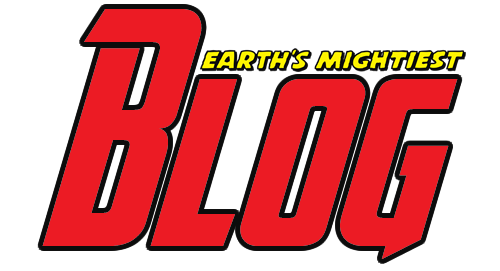NOTE: This post was published on my old site in 2015. It is reprinted here, without change, for posterity.


When it comes to non-Marvel/DC, Image gets most of the attention. But Dark Horse has been around longer—since 1986—publishing truly different comics that often have a horror(ish) bend. And Manga. My first exposure to the publisher was probably Boris the Bear #1 in which a cute teddy bear took a machine gun and slaughtered all the animal knock off characters who were inundating the comic book stands in the late ‘80s (everyone from Teenage Mutant Ninja Turtles to Adolescent Radioactive Blackbelt Hamsters and on down). It was irreverent, hilarious, bloody, and awesome. Everything I wanted as I made the transition from a young comic book reader to an adult one.
Dark Horse has also had early and continued success in adapting their properties to film and TV, including movies like Tank Girl (which had an awesome soundtrack) way back in the early 1990s; more mature works like the Oscar-winning American Splendor; brilliant, “true comic book films” like Hellboy; and hugely influential box office monsters like 300.
These are my personal favorite books from Dark Horse’s long publishing history. As with any list—particularly when the source material is rich and vast—there are regrettable cuts. Here’s my caveats:

- Boris the Bear, which I loved as a kid, isn’t on the list. Only #1 was good–it was a one-note joke-title that shouldn’t have had an issue #2.
- I’m not including Manga here because as a rule I don’t read it. Although I did love Gantz and Lone Wolf and Cub.
- And then there are the “big” Dark Horse books that I just, on a personal level, didn’t fancy. Frank Miller‘s Sin City and 300 are two of these.
Finally, in the interests of space I’m not including licensed properties like Buffy, Star Wars, etc., even though some of them are really, really good (I was shocked at how much I enjoyed their Planet of the Apes stuff, and Brian Wood’s work on Conan was the only time I’ve ever liked a Conan comic).
10. SPY BOY (1999)
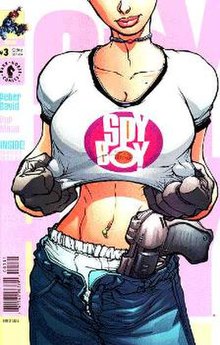
The tenth item on a top ten list is always hard. Because there’s always at least one book you regret having to cut. In this case, it’s The Goon. I liked that book a lot in the beginning, but I dropped it around issue #10.
I read every issue of Spy Boy, though, and mostly because I love Peter David. He’s one of the best writers around, and rarely gets the credit he deserves. It’s a basic action comic—a kid who doubles as a spy. It book was so popular it even crossed over with David’s DC teen team, Young Justice.
9. BIG GUY AND RUSTY THE BOY ROBOT (1995)
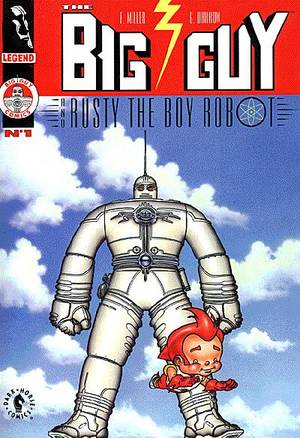
So if you’re gonna team up Frank Miller with Geof Darrow, you can pretty much expect success. And Dark Horse got it with this one, big time—it even became a cartoon. In this two-issue miniseries, we see the titular Rusty fail to prevent the Godzilla-like destruction of Tokyo, so they bring in Big Guy—a symbol of the American military-industrial complex. It’s a simple story, beautifully written and wonderfully illustrated. And it’s one of the few Frank Miller books that’s appropriate for (almost) all ages.
8. THE MILKMAN MURDERS (2004)

I debated for a long time whether to include this four-issue mini by Joe Casey and Steve Parkhouse because the first time I tried to read it, I couldn’t get through it. Casey’s writing is never easy to read, and this is one of his more dense books. But since then, I’ve re-read it several times and each time I find it more chilling. The basic story is aboutu the horror underneath the lives of a perfect American nuclear family. They’re mean to each other. The husband is full of rage. The kids are rude and distant. And one of them kills neighborhood cats and dogs. It continues to descend into violence and madness. It’s not an easy read. But it will stay with you.
7. AXE COP VOLUME 1 (2011)
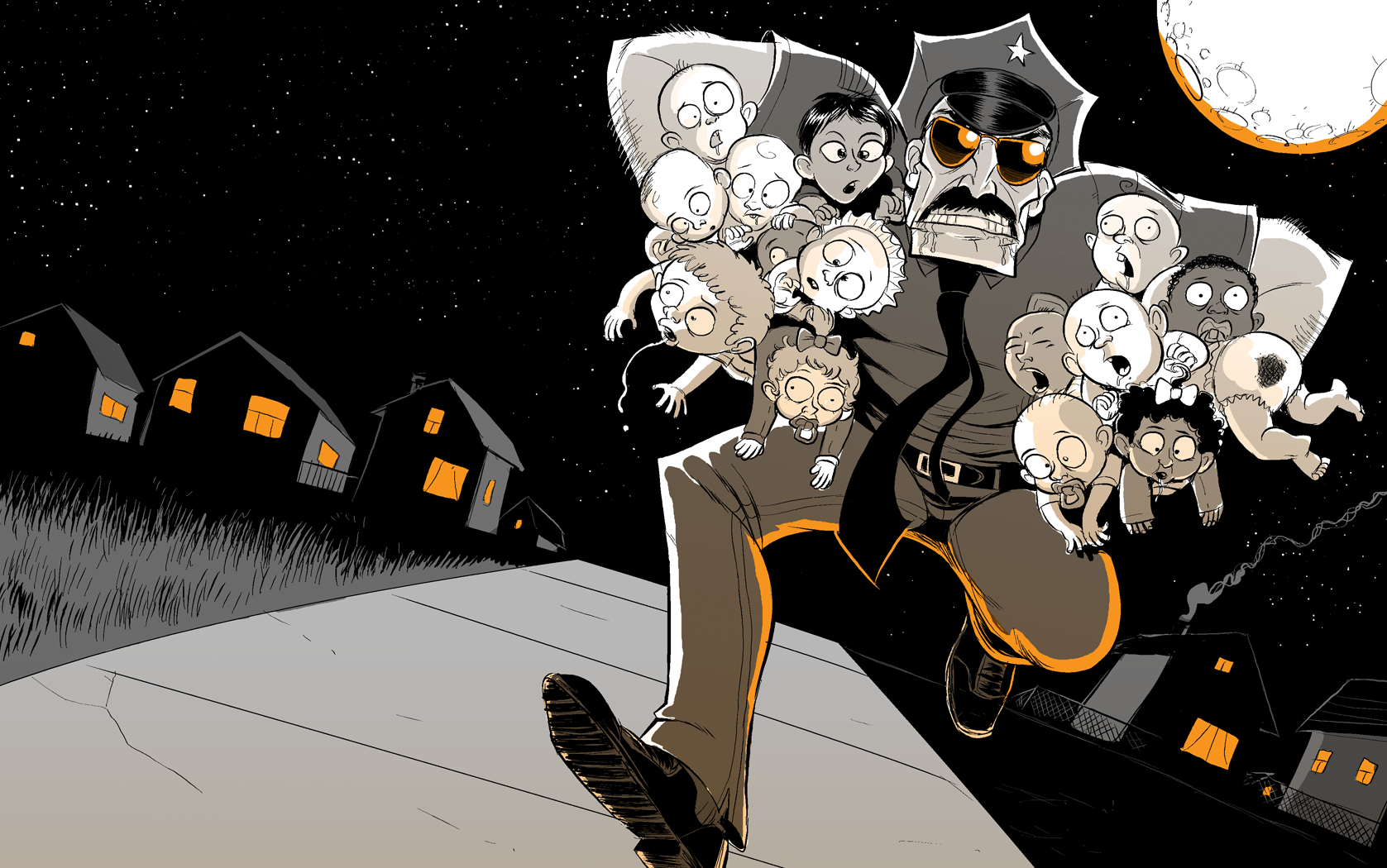
It’s written by little kid, but its drawn by an adult. It’s insane. There are dinosaurs and violence and cops and car chases. It’s silly and impossible. And it might be the most fun you’ll ever have reading a comic. And remember to be grateful that Dark Horse put this webcomic into print form, so we all can enjoy it.
6. REBELS
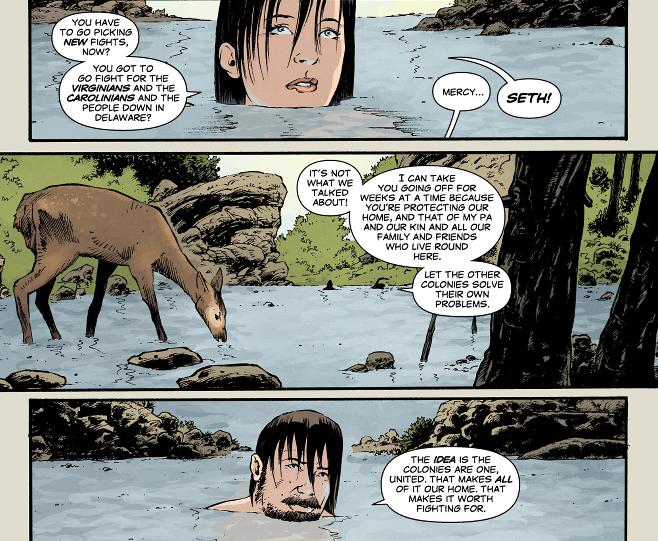
This list probably could have consisted of 50% Brian Wood stories, but some had to be cut. So I didn’t include Demo (which was really only reprinted by Dark Horse, and was first printed elsewhere) and instead included an ongoing series. Rebels is historical fiction, which is always a big risk in the comic book world, but it’s phenomenal. What makes it great are the characters in the story—the Revolutionary War is really only a backdrop for an examination of love, honor, and duty, as well as a look at the effects of big government (a common theme of Wood).
5. LADY KILLER (2015)
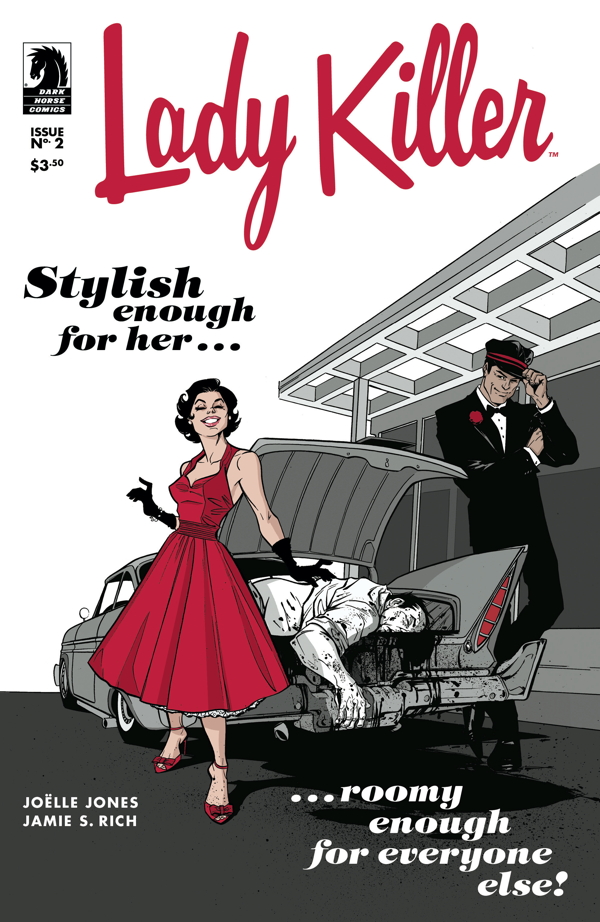
Lady Killer isn’t deep. It’s the story of a 1950s housewife who works nights and weekends as an assassin, and has to keep this identity a secret from her kids and doting husband. It’s also not really anything “new,” in the sense that juxtaposing gorey violence against a suburban idyll has been done before, many times. So why is great? Because it’s so damn smart about it. The writing and characterization is crisp and wholly devoid of stereotyping, and the art alternates between something you might see in a mail order catalog and sweeping, wonderful action sequences. It perfectly captures the torn-between-two-worlds nature of the concept. And then there’s the villains, who don’t seem all that villainous, and the hero, who, as a killer, is hardly heroic. The worst thing the bad guys do (other than kill) is be incredibly sexist. The firm is like a Mad Men version of SHEILD. Oh, and then there’s the color work by Laura Allred that is some of the best I’ve ever seen her do. And that’s saying a lot.
Lady Killer may not be a different kind of story, but it’s definitely a different kind of comic book—and it’s a great example of how just looking at an old story in a new way can make the whole thing seem fresh and extraordinary.
4. HELLBOY (1993)
Hellboy has been the gift that keeps on giving for Dark Horse, spawning any number of spin-offs and miniseries, in addition to two of the best comic book movie adaptations I’ve ever seen. My relationship with the comic is more of arm’s length appreciation—I’ve read many arcs and spin-offs, but I’m not interested enough to read every single issue. Still, I can appreciate it and enjoy it as an extremely well-done comic and a wholly novel premise.
3. THE FIFTH BEATLE (2013)

This is technically perhaps not a Dark Horse book, as it was released on their M Press imprint, but since they funded it and produced it, I’m counting it. Plus, it gives me another opportunity to sing the praises of a biocomic that did not receive nearly enough attention. It’s an emotional, well-researched recounting of Brian Epstein’s experience as a gay man who happened to manage the greatest rock and roll band of all time.

2. THE MASSIVE (2012)
Brian Wood is one of Dark Horse’s best known creators, and he’s a powerhouse. There is certainly room for argument in this area, but for my money The Massive is his best work. It ran for 30 issues and told one long story of postapocalyptic espionage and supernatural mystery. The concept was massive, and the story crushed together so many genres and ideas that some found it unfocused. I can understand that. But it made me think. Every issue was fantastic, the artists who worked on were terrific—everything about it was perfect.
1. MIND MGMT (2012)
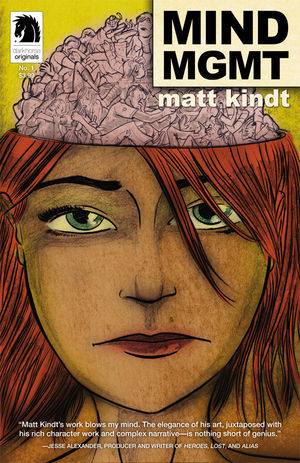
When Mind MGMT #1 came out, everyone was asking: Who the fuck is Matt Kindt? It was shockingly different, with art that looked primitive and sketchy; notes scribbled all around the margins; advertisements and a letters page that contribute to the book’s content; and a story that started out as a horrifying episode of The Twilight Zone but quickly turned into a conspiracy/spy book of epic proportions. Part Bourne Identity, part Lost, part road trip, and partly a treatise on the effects of advertising and subliminal government influence, Mind MGMT is one of the few comic books that actually changed the way I think about politics and life in general. It’s deep, disturbing, and complex—a book for intellectuals that makes no excuses for itself. No, it’s not emotional. It’s cold. And it’s supposed to be. It’s also the best example of how comic books are a unique medium that can be used to tell a story in a way that no other medium can.
